
The issue I had reviewing UFO 50 is not the issue you will have playing it.
Presenting itself as an anthology of all 50 games developed by UFO Soft, a fictional game studio active from 1982-89, UFO 50 is all about breadth and variety. The player is presented with the entire catalog of games from the outset, and they can choose to play them in any order, and for any length of time. These are not WarioWare-style microgames, mind you. They are fully-fledged titles of varying length, ranging from arcade-style side-scrollers to fully developed dungeon crawlers, all presented in the 8-bit style of the imagined “LX” console on which they were first released.
I chose to play the games in chronological order, which is how they are presented by default. In order to review the game, I felt it was important to play all 50, in part because it felt important to at least sample the entirety of what is presented here, but also because, as I quickly came to realize, the unique joy of UFO 50 comes not just from playing the individual games, but from seeing ideas develop over the fictional company’s entire oeuvre. Recurring mechanics, characters, and themes morph and deepen over time. Accordingly, I tried to play enough of each game to comment on it, moving on once I’d gotten a sense of its design and scope, keeping the ultimate goal of finishing my review on time.
Then I got to Bushido Ball, and, well, I kind of forgot about all that.
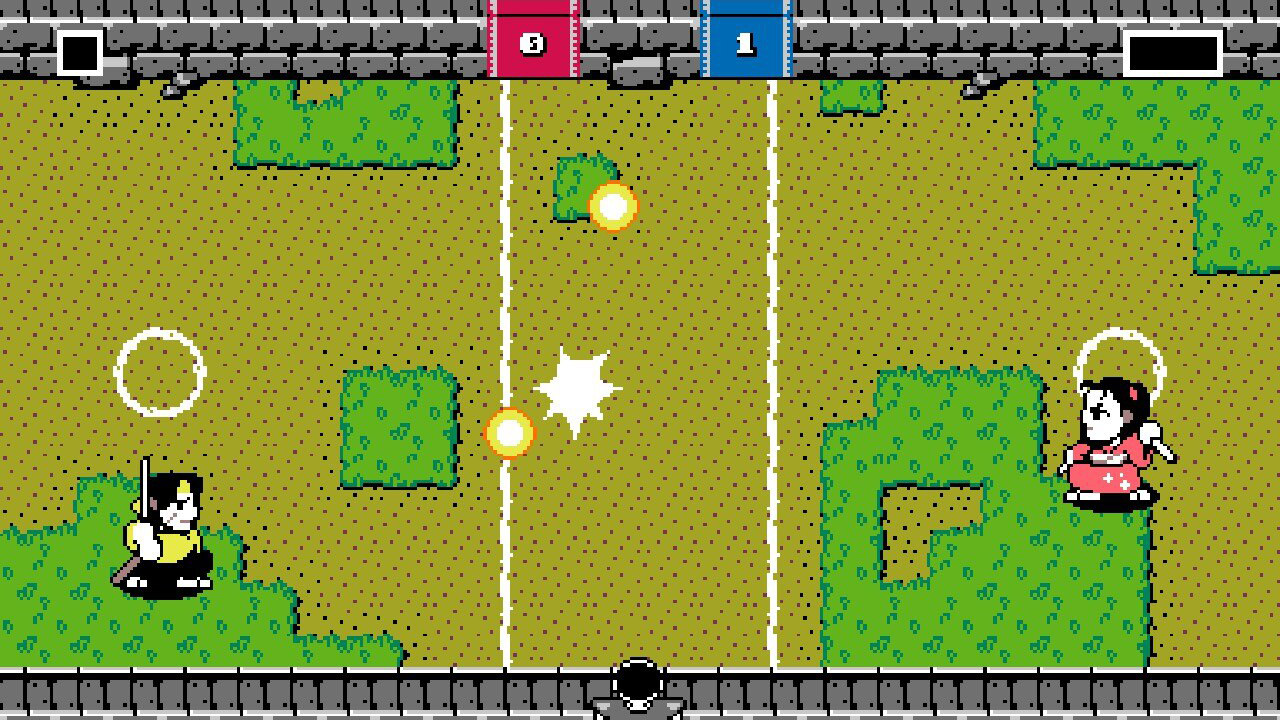
Every game in the collection comes with a short description to give you a sense of what you’re playing. Here’s what it said for Bushido Ball: “It’s the annual Bushido Ball tournament. Choose from 6 fighters and compete to win!” A sports game, I thought. Got it. Bushido Ball was not the first sports-themed game, chronologically. That honor would belong to Kick Club, released one year before. But Bushido Ball, which I would roughly describe as samurai tennis, was so intensely fun that I accidentally played it for an hour and a half straight, losing sight of my goal of playing all 50 titles on only the 14th game in the lineup.
In Bushido Ball, you volley a ball back and forth, slicing it with your sword or, more awkwardly and less effectively, blocking it with your body. You build up a special meter with every successful slice of the ball, allowing you to use two special moves unique to your chosen character. The game progresses tournament style, with increasing difficulty as the volleys get faster and faster, requiring you to discover that you’ve actually had the ability to lob the ball all along (hold the joystick back while you press slice), as well as discovering the ways in which different moves can counter backspin and power shots. The whole thing is a total audiovisual joy and, in addition to the single-player mode, is one of 25 titles in the anthology that includes local multiplayer. If you have a friend, a couch, and fond memories of playing titles like Towerfall or Nidhogg, Bushido Ball alone will make UFO 50 a must-play title in a year filled with must-play titles.
And that’s just one game out of 50.
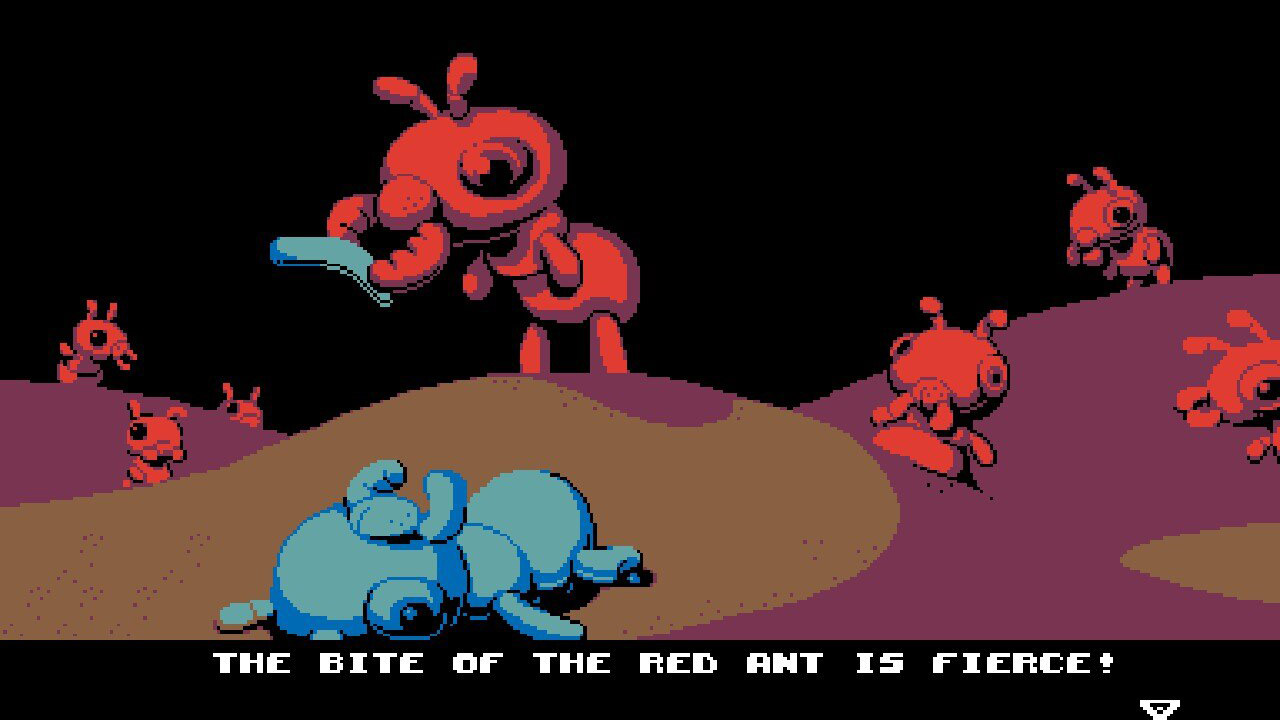
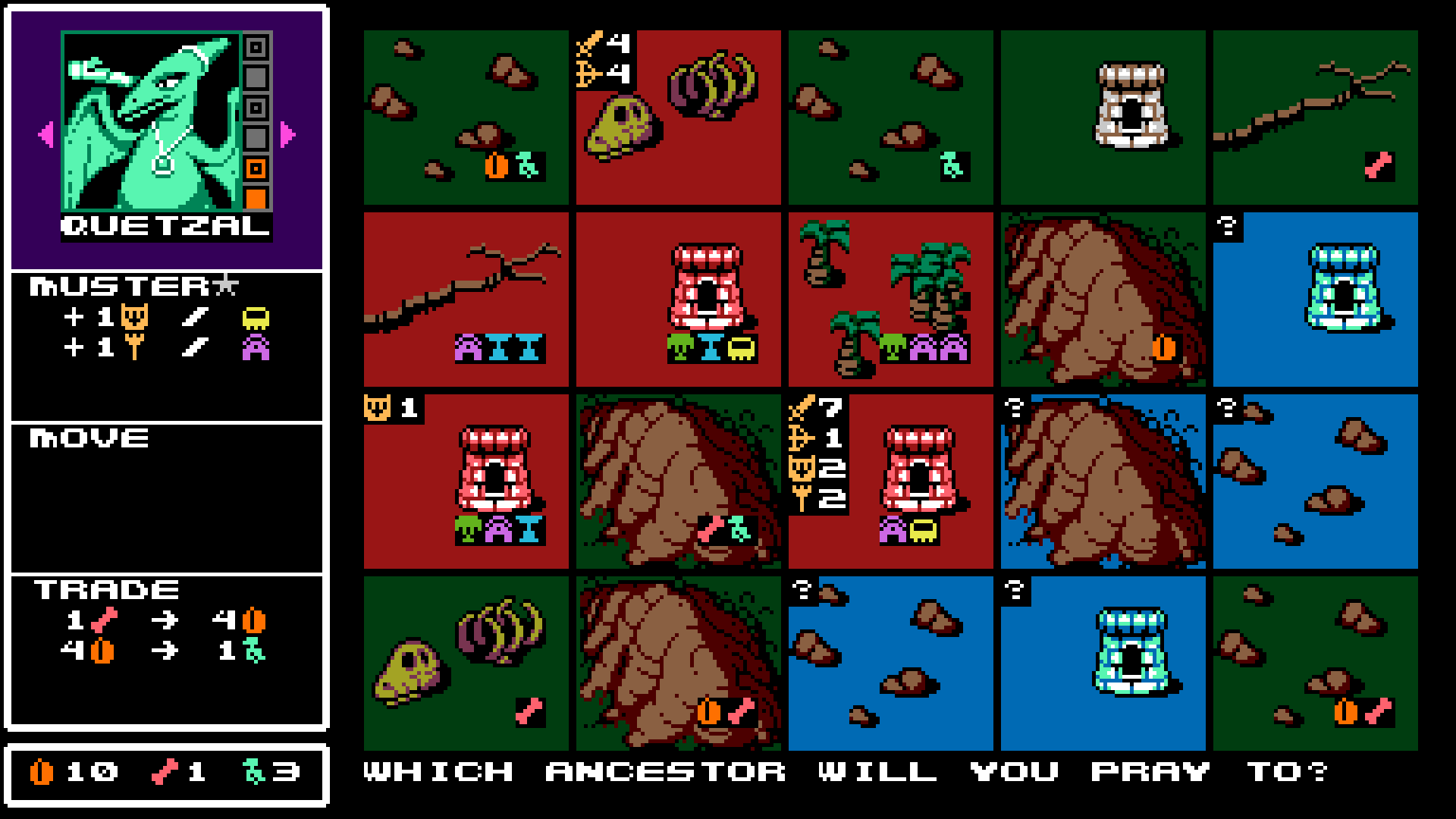
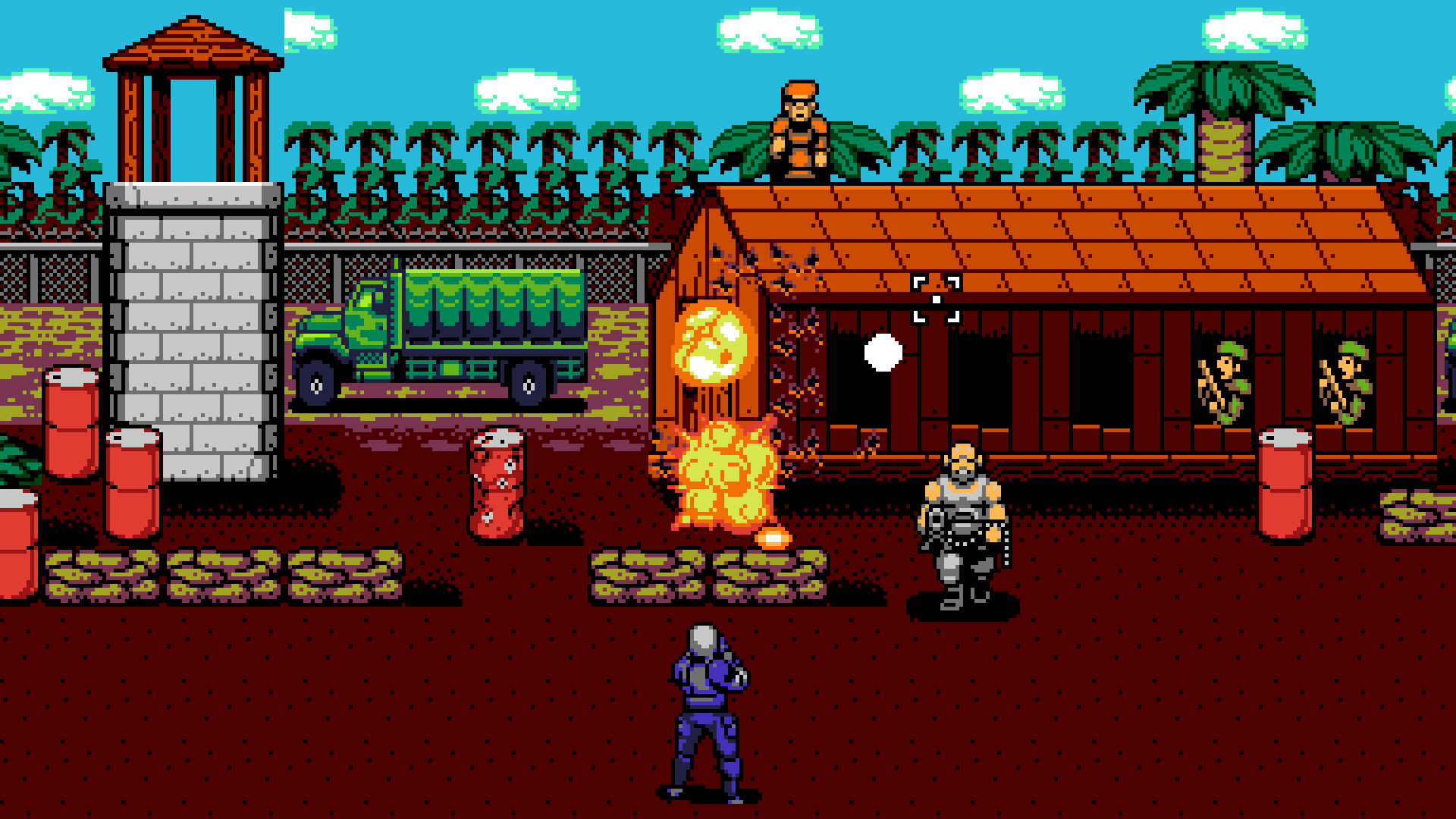
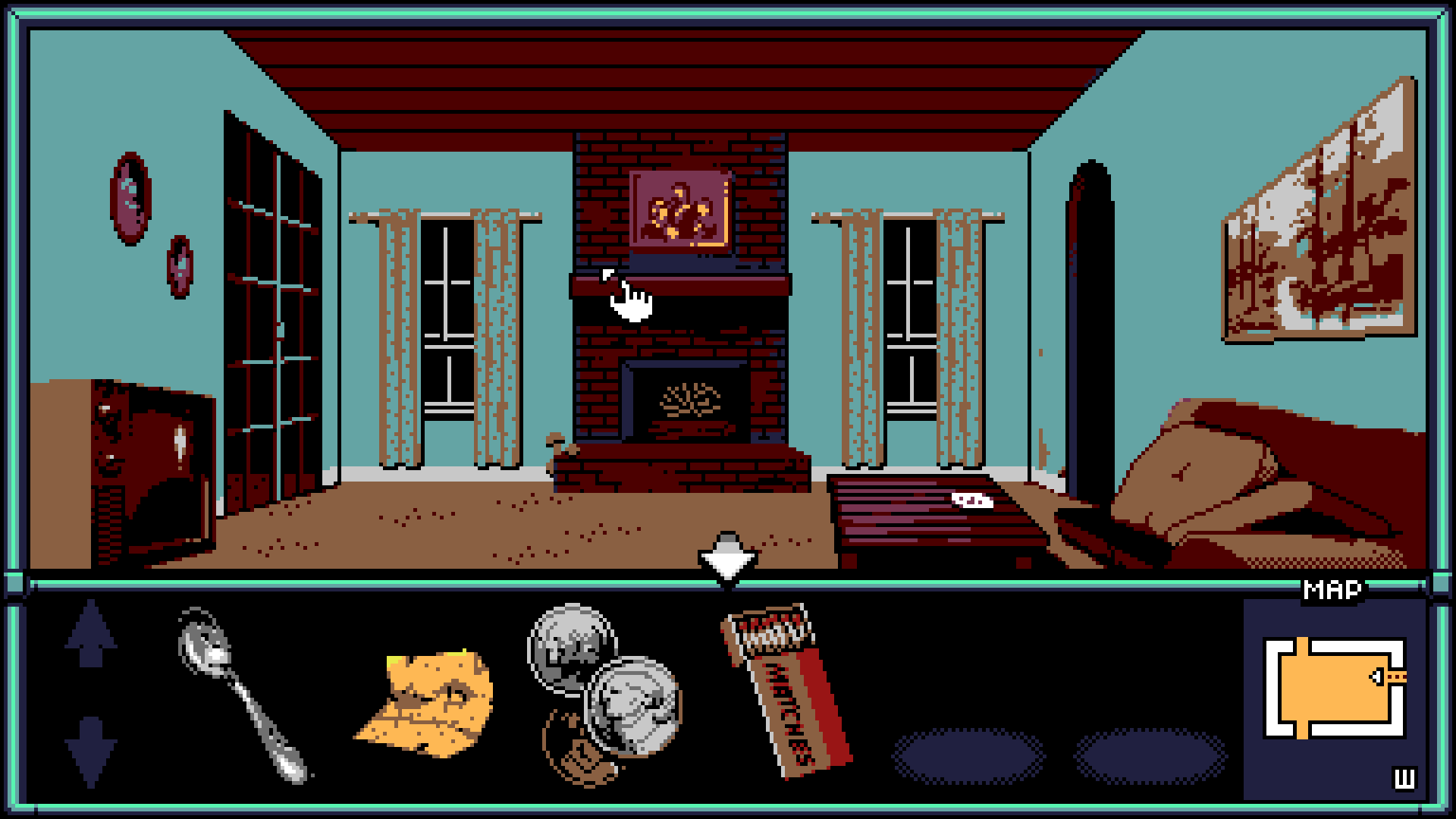
The way I played UFO 50 is not how you should play UFO 50. When a game like Bushido Ball captures your interest, you can and should let yourself get lost in its depth. That’s the joy of this title, full stop. Whether it’s the deck-building party-throwing simulator, the idle game that generates resources while you play the other games, or the three sequels to a game starring an adorable red spacecraft, UFO 50 has an RPG’s worth of content within it — including an honest-to-goodness turn-based RPG. As I sampled title after title, there were many more that I wanted to get lost in, including a Pikmin-ish game starring killer ants, a clever puzzler involving a color-changing chameleon, and an adventure game where you play as a sentient golf ball. UFO 50 has more ideas than any game I’ve played in decades, and the magical thing is they’re all executed well. UFO Soft might not be a real developer, but by the time you’re done with UFO 50, you’ll wish it was.
Which brings me back to the metafictional element of the game. The opening credits posit that, in 2018, Mossmouth and friends (game developers Derek Yu, Jon Perry, Eirik Suhrke, Paul Hubans, Ojiro Fumoto, and Tyriq Plummer, to be specific) discovered a lost LX console in a storage facility, working to rescue the games and make them work on a modern PC. To quote LCD Soundsystem, UFO 50 trades in “borrowed nostalgia for the unremembered ’80s,” functioning as a love letter to 8-bit games and ’80s consoles. But beyond that, it’s also a beautiful reflection on game development itself. Every title is worthy in its own right, but it’s the way they build on each other that makes UFO 50 fly.
Take the first game in the anthology, Barbuta. It is not, to my tastes, consistently fun. It is a brutal Metroid-like with one-hit deaths and only six continues to complete the entire game, and I moved on from it quickly. But without Barbuta, there would be no Mortol, where each time you die, you can make your body into a ledge or stone that makes your next attempt even easier, an idea that gets further evolved in Mortol 2, which turns that concept into a Metroidvania where you get 99 sacrificial characters — warriors, gunners, ninjas, and more — to complete the game, which resets every time you turn it off. You can also track the way the original Campanella charts the course for the expanded sequel, only to take a strange turn in Campanella 3, the penultimate game from the fictional studio. Taking the metafictional conceit even further, you can imagine a critic thinking that 3 lacked the things that made 1 and 2 unique, and that, however enjoyable it is in its own right, one could argue that it isn’t worthy of the Campanella name.
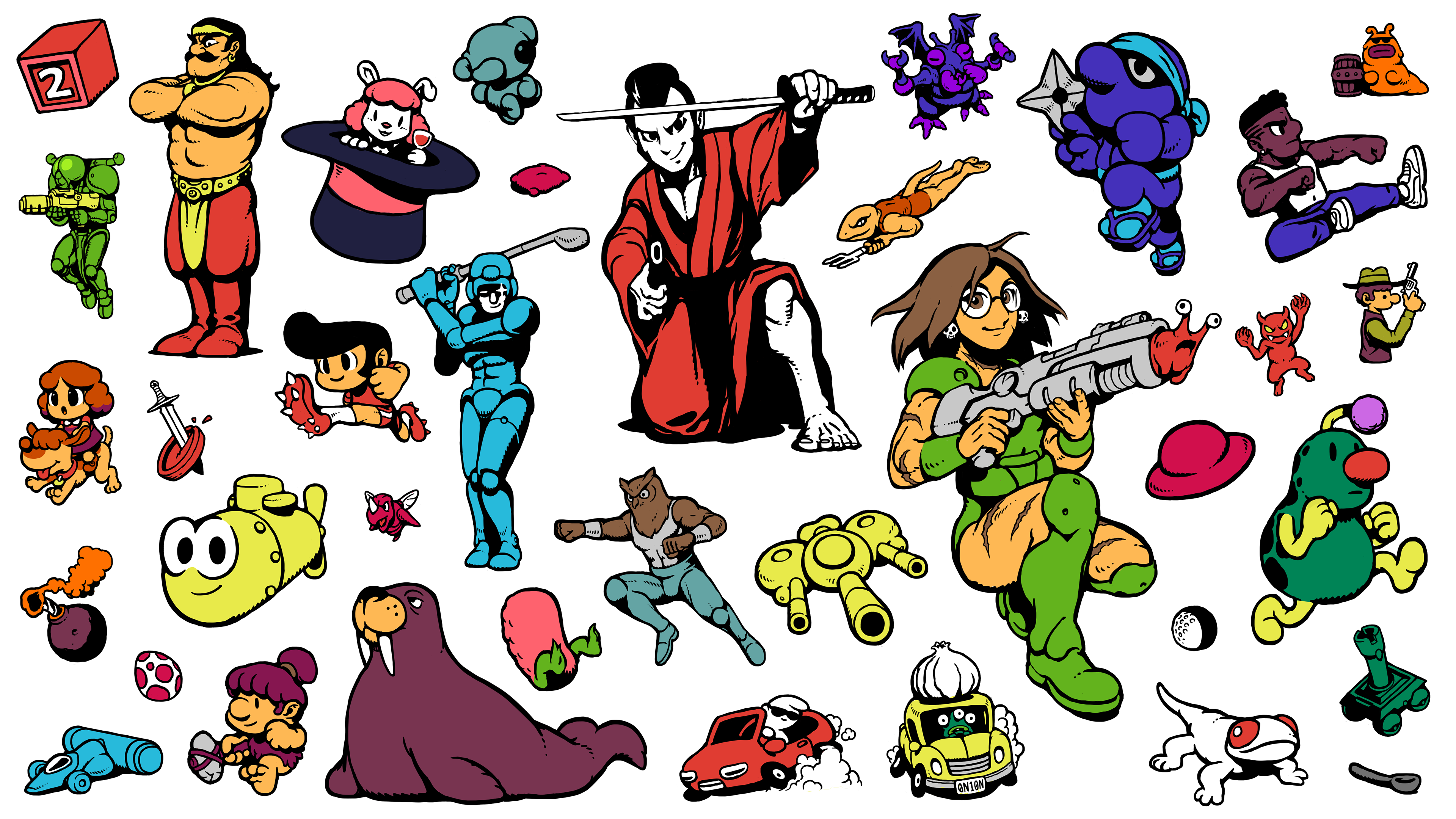
All told, whether you are tracking the histories of individual fictional developers or just the ideas that reoccur from UFO Soft’s very first games to its very last, there is enough going on here to write a dissertation. You can and will get lost in this title and the world it imagines. This is a feast of a game, presented buffet style.
I wholeheartedly recommend UFO 50 on a gameplay level alone. I feel confident in saying, should you be able to stomach high difficulty and occasionally obtuse objectives, you will find a game, or two, or 30 in UFO 50 that will resonate with you. But I also recommend UFO 50 as a metafictional narrative argument that we all benefit when the same people have the opportunity to make multiple titles together. In an industry plagued by layoffs and closures, UFO 50 imagines a group of people who made 50 games together, building off of successes and taking wild swings throughout their career. Sure, it’s a work of fiction, but it’s a hopeful one.
Unmatched in its scope and execution, UFO 50 is a game about creativity and persistence that rewards every minute spent with it. You’ll wish there were another 50 to play next.
UFO 50 will be released Sept. 18 on Windows PC. The game was reviewed on PC using a pre-release download code provided by Mossmouth. Vox Media has affiliate partnerships. These do not influence editorial content, though Vox Media may earn commissions for products purchased via affiliate links. You can find additional information about Polygon’s ethics policy here.
